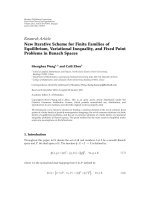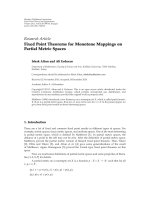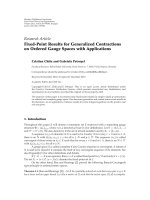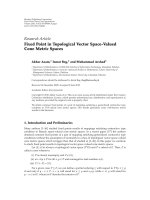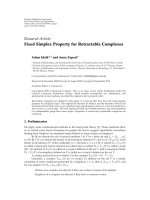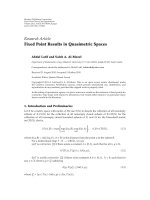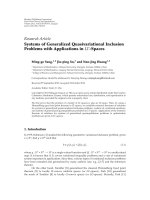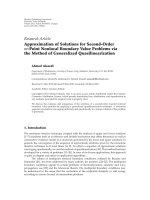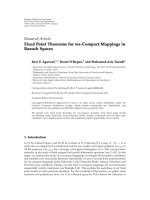Báo cáo hóa học: " Research Article Fixed Point Theory for Contractive Mappings Satisfying Φ-Maps in G-Metric Spaces" ppt
Bạn đang xem bản rút gọn của tài liệu. Xem và tải ngay bản đầy đủ của tài liệu tại đây (475.87 KB, 9 trang )
Hindawi Publishing Corporation
Fixed Point Theory and Applications
Volume 2010, Article ID 181650, 9 pages
doi:10.1155/2010/181650
Research Article
Fixed Point Theory for Contractive Mappings
Satisfying Φ-Maps in G-Metric Spaces
W. Shatanawi
Department of Mathematics, Hashemite University, P.O. Box 150459, Zarqa 13115, Jordan
Correspondence should be addressed to W. Shatanawi, swasfi@hu.edu.jo
Received 23 March 2010; Revised 13 May 2010; Accepted 1 June 2010
Academic Editor: Brailey Sims
Copyright q 2010 W. Shatanawi. This is an open access article distributed under the Creative
Commons Attribution License, which permits unrestricted use, distribution, and reproduction in
any medium, provided the original work is properly cited.
We prove some fixed point results for self-mapping T : X → X in a complete G-metric space X
under some contractive conditions related to a nondecreasing map φ : 0, ∞ → 0, ∞ with
lim
n → ∞
φ
n
t0forallt ∈ 0, ∞. Also, we prove the uniqueness of such fixed point, as well as
studying the G-continuity of such fixed point.
1. Introduction
The fixed point theorems in metric spaces are playing a major role to construct methods
in mathematics to solve problems in applied mathematics and sciences. So the attraction of
metric spaces to a large numbers of mathematicians is understandable. Some generalizations
of the notion of a metric space have been proposed by some authors. In 2006, Mustafa
in collaboration with Sims introduced a new notion of generalized metric space called G-
metric space 1. In fact, Mustafa et al. studied many fixed point results for a self-mapping
in G-metric space under certain conditions; see1–5. In the present work, we study some
fixed point results for self-mapping in a complete G-metric space X under some contractive
conditions related to a nondecreasing map φ : 0, ∞ → 0, ∞ with lim
n → ∞
φ
n
t0for
all t ∈ 0, ∞.
2. Basic Concepts
In this section, we present the necessary definitions and theorems in G-metric spaces.
Definition 2.1 see 1.LetX be a nonempty set and let G : X × X × X → R
be a function
satisfying the following properties:
2 Fixed Point Theory and Applications
1G
1
Gx, y, z0ifx y z;
2G
2
0 <Gx, x, y, for all x, y ∈ X with x
/
y;
3G
3
Gx, x, y ≤ Gx, y, z for all x, y, z ∈ X with z
/
y;
4G
4
Gx, y, zGx, z, yGy,z, x···, symmetry in all three variables;
5G
5
Gx, y, z ≤ Gx, a, aGa, y, z for all x, y, z, a ∈ X.
Then the function G is called a generalized metric, or, more specifically, a G-metric on X,and
the pair X, G is called a G-metric space.
Definition 2.2 see 1.LetX, G be a G-metric space, and let x
n
be a sequence of points of
X,apointx ∈ X is said to be the limit of the sequence x
n
, if lim
n,m → ∞
Gx, x
n
,x
m
0, and
we say that the sequence x
n
is G-convergent to x or x
n
G-converges to x.
Thus, x
n
→ x in a G-metric space X, G if for any ε>0, there exists k ∈ N such that
Gx, x
n
,x
m
<εfor all m, n ≥ k.
Proposition 2.3 see 1. Let X, G be a G-metric space. Then the following are equivalent.
1x
n
is G-convergent to x.
2 Gx
n
,x
n
,x → 0 as n → ∞.
3 Gx
n
,x,x → 0 as n → ∞.
4 Gx
n
,x
m
,x → 0 as n, m → ∞.
Definition 2.4 see 1.LetX, G be a G-metric space; a sequence x
n
is called G-Cauchy
if for every ε>0, there is k ∈ N such that Gx
n
,x
m
,x
l
<ε, for all n, m, l ≥ k;thatis,
Gx
n
,x
m
,x
l
→ 0asn, m, l → ∞.
Proposition 2.5 see 3. Let X, G be a G-metric space. Then the following are equivalent.
1 The sequence x
n
is G-Cauchy.
2 For every >0,thereisk ∈ N such that Gx
n
,x
m
,x
m
<, for all n, m ≥ k.
Definition 2.6 see 1.LetX, G and X
,G
be G-metric spaces, and let f : X, G →
X
,G
be a function. Then f is said to be G-continuous at a point a ∈ X if and only if for every
ε>0, there is δ>0 such that x,y ∈ X and Ga, x, y <δimplies G
fa,fx,fy <ε.A
function f is G-continuous at X if and only if it is G-continuous at all a ∈ X.
Proposition 2.7 see 1. Let X, G and X
,G
be G-metric spaces. Then f : X → X
is G-
continuous at x ∈ X if and only if it is G-sequentially continuous at x; that is, whenever x
n
is
G-convergent to x, fx
n
is G-convergent to fx.
Proposition 2.8 see 1. Let X, G be a G-metric space. Then the function Gx, y, z is jointly
continuous in all three of its variables.
The following are examples of G-metric spaces.
Fixed Point Theory and Applications 3
Example 2.9 see 1.LetR,d be the usual metric space. Define G
s
by
G
s
x, y, z
d
x, y
d
y, z
d
x, z
2.1
for all x, y, z ∈ R. Then it is clear that R,G
s
is a G-metric space.
Example 2.10 see 1.LetX {a, b}. Define G on X × X × X by
G
a, a, a
G
b, b, b
0,
G
a, a, b
1,G
a, b, b
2
2.2
and extend G to X × X × X by using the symmetry in the variables. Then it is clear that X, G
is a G-metric space.
Definition 2.11 see 1.AG-metric space X, G is called G-complete if every G-Cauchy
sequence in X, G is G-convergent in X, G.
3. Main Results
Following to Matkowski 6,letΦ be the set of all functions φ such that φ : 0, ∞ → 0, ∞
be a nondecreasing function with lim
n → ∞
φ
n
t0 for all t ∈ 0, ∞.Ifφ ∈ Φ, then φ is
called Φ-map. If φ is Φ-map, then it is an easy matter to show that
1 φt <tfor all t ∈ 0, ∞;
2 φ00.
From now unless otherwise stated we mean by φ the Φ-map. Now, we introduce and prove
our first result.
Theorem 3.1. Let X be a complete G-metric space. Suppose the map T : X → X satisfies
G
T
x
,T
y
,T
z
≤ φ
G
x, y, z
3.1
for all x, y, z ∈ X.ThenT
has a unique fixed point (say u) and T is G-continuous at u.
Proof. Choose x
0
∈ X.Letx
n
Tx
n−1
, n ∈ N. Assume x
n
/
x
n−1
, for each n ∈ N. Claim x
n
is a G-Cauchy sequence in X:forn ∈ N, we have
G
x
n
,x
n1
,x
n1
G
T
x
n−1
,T
x
n
,T
x
n
≤ φ
G
x
n−1
,x
n
,x
n
≤ φ
2
G
x
n−2
,x
n−1
,x
n−1
.
.
.
≤ φ
n
G
x
0
,x
1
,x
1
.
3.2
4 Fixed Point Theory and Applications
given >0, since lim
n → ∞
φ
n
Gx
0
,x
1
,x
1
0andφ <, there is an integer k
0
such that
φ
n
G
x
0
,x
1
,x
1
<− φ
∀ n ≥ k
0
. 3.3
Hence
G
x
n
,x
n1
,x
n1
<− φ
∀ n ≥ k
0
. 3.4
For m, n ∈ N with m>n, we claim that
G
x
n
,x
m
,x
m
< for all m ≥ n ≥ k
0
. 3.5
We prove Inequality 3.5 by induction on m. Inequality 3.5 holds for m n 1byusing
Inequality 3.4 and the fact that − φ <. Assume Inequality 3.5 holds for m k. For
m k 1, we have
G
x
n
,x
k1
,x
k1
≤ G
x
n
,x
n1
,x
n1
G
x
n1
,x
k1
,x
k1
<− φ
φ
G
x
n
,x
k
,x
k
<− φ
φ
.
3.6
By induction on m, we conclude that Inequality 3.5 holds for all m ≥ n ≥ k
0
.Sox
n
is
G-Cauchy and hence x
n
is G-convergent to some u ∈ X. For n ∈ N, we have
G
u, u, T
u
≤ G
u, u, x
n1
G
x
n1
,x
n1
,T
u
≤ G
u, u, x
n1
φ
G
x
n
,x
n
,u
<G
u, u, x
n1
G
x
n
,x
n
,u
.
3.7
Letting n → ∞, and using the fact that G is continuous on its variable, we get that
Gu, u, Tu 0. Hence Tuu.Sou is a fixed point of T.Now,letv be another fixed
point of T with v
/
u. Since φ is a φ-map, we have
G
u, u, v
G
T
u
,T
u
,T
v
≤ φ
G
u, u, v
<G
u, u, v
3.8
which is a contradiction. So u v, and hence Thas a unique fixed point. To Show that T is
Fixed Point Theory and Applications 5
G-continuous at u,lety
n
be any sequence in X such that y
n
is G-convergent to u. For
n ∈ N, we have
G
u, u, T
y
n
G
T
u
,T
u
,T
y
n
≤ φ
G
u, u, y
n
<G
u, u, y
n
.
3.9
Letting n → ∞, we get lim
n → ∞
Gu, u, Ty
n
0. Hence Ty
n
is G-convergent to u
Tu.SoT is G-continuous at u.
As an application of Theorem 3.1, we have the following results.
Corollary 3.2. Let X be a complete G-metric space. Suppose that the map T : X → X satisfies for
m ∈ N:
G
T
m
x
,T
m
y
,T
m
z
≤ φ
x, y, z
3.10
for all x, y, z ∈ X.ThenT has a unique fixed point (say u).
Proof. From Theorem 3.1, we conclude that T
m
has a unique fixed point say u. Since
T
u
T
T
m
u
T
m1
u
T
m
T
u
,
3.11
we have that Tu is also a fixed point to T
m
. By uniqueness of u,wegetTuu.
Corollary 3.3. Let X be a complete G-metric space. Suppose that the map T : X → X satisfies
G
T
x
,T
y
,T
y
≤ φ
G
x, y, y
, 3.12
for all x, y ∈ X.ThenT has a unique fixed point (say u) and T is G-continuous at u.
Proof. follows from Theorem 3.1 by taking z y.
Corollary 3.4. Let X be a complete G-metric space. Suppose there is k ∈ 0, 1 such that the map
T : X → X satisfies
G
T
x
,T
y
,T
z
≤ kG
x, y, z
, 3.13
for all x, y, z ∈ X.ThenT has a unique fixed point (say u) and T is G-continuous at u.
Proof. Define φ : 0, ∞ → 0, ∞ by φwkw. Then it is clear that φ is a nondecreasing
function with lim
n → ∞
φ
n
t0 for all t>0. Since
G
T
x
,T
y
,T
z
≤ φ
G
x, y, z
∀ x, y, z ∈ X, 3.14
the result follows from Theorem 3.1.
6 Fixed Point Theory and Applications
The above corollary has been stated in 7, Theorem 5.1.7, and proved by a different
way.
Corollary 3.5. Let X be a complete G-metric space. Suppose the map T : X → X satisfies
G
T
x
,T
y
,T
z
≤
G
x, y, z
1 G
x, y, z
, 3.15
for all x, y, z ∈ X.ThenT has a unique fixed point (say u) and T is G-continuous at u.
Proof. Define φ : 0, ∞ → 0, ∞ by φww/1 w. Then it is clear that φ is a
nondecreasing function with lim
n → ∞
φ
n
t0 for all t>0. Since
G
T
x
,T
y
,T
z
≤ φ
G
x, y, z
∀ x, y, z ∈ X, 3.16
the result follows from Theorem 3.1.
Theorem 3.6. Let X be a complete G-metric space. Suppose that the map T : X → X satisfies
G
T
x
,T
y
,T
z
≤φ
max
G
x, y, z
,G
x, T
x
,T
x
,G
y, T
y
,T
y
,G
T
x
,y,z
3.17
for all x, y, z ∈ X.ThenT has a unique fixed point (say u) and T is G-continuous at u.
Proof. Choose x
0
∈ X.Letx
n
Tx
n−1
, n ∈ N. Assume x
n
/
x
n−1
, for each n ∈ N.Thusfor
n ∈ N, we have
G
x
n
,x
n1
,x
n1
G
T
x
n−1
,T
x
n
,T
x
n
≤ φmax
{
G
x
n−1
,x
n
,x
n
,G
x
n−1
,x
n
,x
n
,G
x
n
,x
n1
,x
n1
,G
x
n
,x
n
,x
n
}
.
3.18
If
max
{
G
x
n−1
,x
n
,x
n
,G
x
n
,x
n1
,x
n1
,G
x
n
,x
n
,x
n
}
G
x
n
,x
n1
,x
n1
, 3.19
then
G
x
n
,x
n1
,x
n1
≤ φ
G
x
n
,x
n1
,x
n1
<G
x
n
,x
n1
,x
n1
, 3.20
which is impossible. So it must be the case that
max
{
G
x
n−1
,x
n
,x
n
,G
x
n
,x
n1
,x
n1
,G
x
n
,x
n
,x
n
}
G
x
n−1
,x
n
,x
n
, 3.21
Fixed Point Theory and Applications 7
and hence
G
x
n
,x
n1
,x
n1
≤ φ
G
x
n−1
,x
n
,x
n
. 3.22
Thus for n ∈ N, we have
G
x
n
,x
n1
,x
n1
G
T
x
n−1
,T
x
n
,T
x
n
≤ φ
G
x
n−1
,x
n
,x
n
≤ φ
2
G
x
n−2
,x
n−1
,x
n−1
.
.
.
≤ φ
n
G
x
0
,x
1
,x
1
.
3.23
The same argument is similar to that in proof of Theorem 3.1; one can show that x
n
is a
G-Cauchy sequence. Since X is G-complete, we conclude that x
n
is G-convergent to some
u ∈ X. For n ∈ N, we have
G
u, u, T
u
≤ G
u, u, x
n
G
x
n
,x
n
,T
u
≤ G
u, u, x
n
φ
max
{
G
x
n−1
,x
n−1
,u
,G
x
n−1
,x
n
,x
n
,G
x
n−1
,x
n
,x
n
,G
x
n
,x
n−1
,u
}
.
3.24
Case 1.
max
{
G
x
n−1
,x
n−1
,u
,G
x
n−1
,x
n
,x
n
,G
x
n
,x
n−1
,u
}
G
x
n−1
,x
n
,x
n
, 3.25
then we have
G
u, u, T
u
<G
u, u, x
n
G
x
n−1
,x
n
,x
n
. 3.26
Letting n → ∞, we conclude that Gu, u, Tu 0, and hence Tuu.
Case 2.
max
{
G
x
n−1
,x
n−1
,u
,G
x
n−1
,x
n
,x
n
,G
x
n
,x
n−1
,u
}
G
x
n−1
,x
n−1
,u
, 3.27
then we have
G
u, u, T
u
<G
u, u, x
n
G
x
n−1
,x
n−1
,u
. 3.28
Letting n → ∞, we conclude that Gu, u, Tu 0, and hence Tuu.
8 Fixed Point Theory and Applications
Case 3.
max
{
G
x
n−1
,x
n−1
,u
,G
x
n−1
,x
n
,x
n
,G
x
n−1
,x
n
,x
n
,G
x
n
,x
n−1
,u
}
G
x
n
,x
n−1
,u
,
3.29
then we have
G
u, u, T
u
<G
u, u, x
n
G
x
n
,x
n−1
,u
≤ G
u, u, x
n
G
x
n
,x
n−1
,x
n−1
G
x
n−1
,x
n−1
,u
.
3.30
Letting n → ∞, we conclude that Gu, u, Tu 0, and hence Tuu.Inallcases,we
conclude that u is a fixed point of T.Letv be any other fixed point of T such that v
/
u.
Then
G
u, v, v
≤ φ
max
{
G
u, v, v
,G
u, u, u
,G
v, v, v
,G
u, v, v
}
φ
G
u, v, v
<G
u, v, v
,
3.31
which is a contradiction since φGu, v, v <Gu, v, v. Therefore, Gu, v, v0 and hence
u
v. To show that T is G-continuous at u,lety
n
be any sequence in X such that y
n
is
G-convergent to u. Then
G
u, u, T
y
n
≤ φ
max
G
u, u, y
n
,G
u, u, u
,G
u, u, u
,G
u, u, y
n
φ
G
u, u, y
n
<G
u, u, y
n
.
3.32
Let n → ∞,wegetthatTy
n
is G-convergent to Tuu. Hence T is G-continuous at u.
As an application to Theorem 3.6, we have the following results.
Corollary 3.7. Let X be a complete G-metric space. Suppose there is k ∈ 0, 1 such that the map
T : X → X satisfies
G
Tx
,T
y
,T
z
≤ k max
G
x, y, z
,G
x, T
x
,T
x
,G
y, T
y
,T
y
,G
T
x
,y,z
3.33
for all x, y, z ∈ X.ThenT has a unique fixed point (say u) and T is G-continuous at u.
Proof. Define φ : 0, ∞
→ 0, ∞ by φwkw. Then it is clear that φ is a nondecreasing
function with lim
n → ∞
φ
n
t0 for all t>0. Since
G
T
x
,T
y
,T
z
≤ φ
max
G
x, y, z
,G
x, T
x
,T
x
,G
y, T
y
,T
y
,G
T
x
,y,z
3.34
for all x, y, z ∈ X, the result follows from Theorem 3.6.
Fixed Point Theory and Applications 9
Corollary 3.8. Let X be a complete G-metric space. Suppose that the map T : X → X satisfies:
G
T
x
,T
y
,T
y
≤φ
max
G
x, y, y
,G
x, T
x
,T
x
,G
y, T
y
,T
y
,G
T
x
,y,y
3.35
for all x, y ∈ X.ThenT has a unique fixed point (say u) and T is G-continuous at u.
Proof. It follows from Theorem 3.6 by replacing z y.
Acknowledgments
The author would like to thank the editor of the paper and the referees for their precise
remarks to improve the presentation of the paper. This paper is financially supported by
the Deanship of the Academic Research at the Hashemite University, Zarqa, Jordan.
References
1 Z. Mustafa and B. Sims, “A new approach to generalized metric spaces,” Journal of Nonlinear and Convex
Analysis, vol. 7, no. 2, pp. 289–297, 2006.
2 Z. Mustafa, H. Obiedat, and F. Awawdeh, “Some fixed point theorem for mapping on complete G-
metric spaces,” Fixed Point Theory and Applications, vol. 2008, Article ID 189870, 12 pages, 2008.
3 Z. Mustafa and B. Sims, “Some remarks concerning D-metric spaces,” in Proceedings of the International
Conference on Fixed Point Theory and Applications, pp. 189–198, Yokohama, Yokohama, Japan, 2004.
4 Z. Mustafa and B. Sims, “Fixed point theorems for contractive mappings in complete G-metric spaces,”
Fixed Point Theory and Applications, vol. 2009, Article ID 917175, 10 pages, 2009.
5 Z. Mustafa, W. Shatanawi, and M. Bataineh, “Existence of fixed point results in G-metric spaces,”
International Journal of Mathematics and Mathematical Sciences, vol. 2009, Article ID 283028, 10 pages,
2009.
6 J. Matkowski, “Fixed point theorems for mappings with a contractive iterate at a point,” Proceedings of
the American Mathematical Society, vol. 62, no. 2, pp. 344–348, 1977.
7 Z. Mustafa, A new structure for generalized metric spaces with applications to fixed point theory, Ph.D. thesis,
University of Newcastle, Newcastle, UK, 2005.

